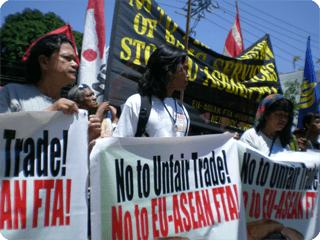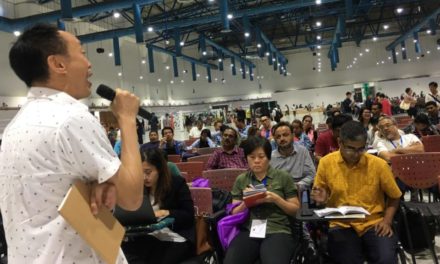demanding that Japan open up its agricultural market in the same way that "other countries have opened their markets to Japanese manufactured goods." It is the concluding press conference of the Tokyo mini-ministerial and the uncompromising words and body language of Zoellick, his pal European Trade Commissioner Pascal Lamy, and other participants spell
trouble for the ongoing World Trade Organization (WTO) negotiations on agriculture.
The draft negotiating document prepared by WTO farm negotiations chairman Stuart Harbinson zoomed to the top of the agenda when, even before the meeting began, Japanese Minister of Agriculture Tadamori Oshima
rejected the paper’s proposals for minimum cuts of between 25 and 45 per cent and average reductions of 40 to 60 per cent on all farm tariffs over five years.
The European Union (EU) also attacked the Harbinson proposal as "unbalanced" for proposing that "trade-distorting" subsidies be cut by 60 per cent over five years and that export subsidies be phased out entirely over nine years. Both Japan and the EU denounced the paper as ensuring that the US would be the only victor in the negotiations.
Harbinson Draft Sidesteps Developing Country Concerns
In the fight between the agro-export giants, the concerns of developing countries were conveniently lost. As Focus on the Global South analyst Aileen Kwa points out, the Harbinson text does not address their
fear that EU and US subsidies will now mostly be shifted to the so-called "Green Box," a listing of exempted subsidies that include the massive direct
payments to farming interests that directly or indirectly distort trade.
The Harbinson text also completely ignores proposals put forward by Argentina and the Philippines (both of which were not invited to the Tokyo meeting) for countervailing mechanisms that would allow developing
countries to raise tariffs on crops subsidized by the developed countries by amounts proportionate to the subsidies. Instead, for developing countries, tariffs greater than 120 per cent are to be slashed by 40 per cent, while those between 20 and 120 per cent will be decreased by 33 per cent, with no linkage to the subsidies maintained by the wealthy agro-exporters.
The draft also contains no meaningful recommendations that would apply the principle of "special and differential treatment" to the developing countries,
giving their agricultural sectors significant protection for structural reasons–owing to their different level and conditions of agricultural development.
In essence, the Harbinson draft proposes to change some of the terms of monopolistic competition among the EU, US, Australia, and Canada while accelerating the removal of the protective barriers of the developing country markets they are fighting over.
Transparency Issue Ignored
Concerns raised about the transparency of the Mini-ministerial and its legitimacy did not seem to ruffle representatives of the 22 governments
participating in it. Perhaps this was because the issue barely made it to the press, except for very brief allusions in the English-language newspapers and
one short clip in Japan’s NHK television network. Non-transparency was, however, the central issue at a civil society gathering sponsored by ATTAC Japan, the Consumers Union of Japan, and other civil society organizations on Feb. 14. The meeting was attended by about 400 people from different sectors, which indicated the great potential for organizing on the
WTO in Japan.
Other burning issues also received perfunctory discussion at the mini-ministerial. Among these was the continuing controversy over the US’s effort to water down the Doha Declaration’s provision overriding Trade-Related Intellectual Property Rights Agreement (TRIPs) in the interest of public health. In Tokyo, Washington refused to back away from its position of strictly limiting the number of diseases for which public health would be prioritized over patents. NGO’s like Medicines sans frontiers, Africa Japan
Forum, and Oxfam International lobbied participating governments to reject the TRIPs Council’s recent recommendation (obviously inspired by the US) that compulsory licensing of critical drugs be limited to "national emergencies or other conditions of extreme urgency." They pointed out that the Doha Declaration said nothing about limiting the overriding of TRIPs to "national emergencies."
Scripted Meeting?
We had a chance to bring these other concerns directly to Japanese Foreign Minister Yoriko Kawaguchi, host of the mini-ministerial, on Feb. 15. She had agreed earlier to meet with an NGO delegation. Ten minutes after we were ushered into the meeting room in Tokyo’s Imperial Hotel, however, Deputy Foreign Minister Ichiro Fujisaki’s cell phone rang to convey the Foreign Minister’s regret that owing to the "tightness of her schedule," she couldn’t make it. I had a strong feeling that Kawaguchi and Fujisaki had scripted the whole thing.
So we were reduced to presenting our concerns to Fujisaki, who displayed the appropriate gravitas as photographers snapped away to record yet another instance of the Japanese government’s sensitivity to the concerns of civil society.
Aside from the TRIPs issue and the non-transparency of the meeting, we brought up our apprehension about Japan’s leading role in pushing negotiations on the New Issues, particularly investment. The developing
countries, we pointed out, felt threatened by Japan’s position, which has not budged from its formulation prior to the Seattle ministerial: "National Treatment and the most-favored nation treatment are the basic principles of the WTO Agreement, and thus should be included in the future investment rules of the WTO. In particular, once a foreign country is established
in a host country, it should, in principle, be treated in a manner equal to that of domestic companies, as there are in most cases no rationales for
discriminatory treatment."
Japan has been so dogged in pursuing its line on investment that prior to the Doha ministerial, according to sources in Geneva, Tokyo warned Jakarta
that any attempt by the Indonesians to block its efforts to bring investment into the WTO would affect Japanese investors’ willingness to bring their capital to Indonesia.
After politely listening, Fujisaki limited himself to two comments: First, that the mini-ministerial was an "informal meeting." Second, that "Japan’s position on investment was shared by other countries."
How not to Isolate the WTO
Compared to the Sydney mini-ministerial, there was clearly a failure to make the meeting in Tokyo controversial in the public view. A great deal of the
responsibility must belong to the leaders of the Japanese farmers’ organizations, especially the Central Union of Agricultural Cooperatives (Zenchu).
The pitifully small demonstration by less than 2000 largely aging farmers organized by Zenchu on Saturday morning, Feb. 15, showed up the weaknesses of its approach to mobilizing public opinion around the WTO.
First of all, none of the other issues such as TRIPs, non-transparency, and Japan’s position on investment were even alluded to by the 15 or so speakers at the pre-march rally at Hibiya Park. Instead of universalizing the Japanese farmers’ struggle to other-and younger–constituencies, the organizers seemed intent on confining the WTO question to agriculture. No wonder the WTO in Japan is seen largely as an aging farmers’ issue! I wanted to rush up the stage to say that the one of the key issues was
the legitimacy of the gathering taking place at the Imperial Hotel a few blocks away, but nobody seemed to be able to help me contact the organizers.
Second, the theme of the rally was to show Japanese farmers’support of both the Japanese government and the European Union. The rhetoric about protecting small farmers was there, as were impassioned references to agriculture being unlike industry in that it is a way of life and has a beneficial impact on the environment. But in the interest of maintaining an intergovernmental alliance, Japanese farmers were not told that Japanese agriculture and EU agriculture are fundamentally different. Japan is not an agricultural exporting country but one where farmers are simply trying to survive and maintain an organic tie to the rest of the society. The EU is a
massive agro-exporter whose subsidized products are creating havoc among small farmers throughout the developing world. The real interest of Japanese farmers lies in allying themselves with small farmers in the developing world in a common front against dumping, not with large-scale EU agricultural interests and agro-technocrats in Brussels.
Denouement
To be sure, other civil society organizations joined the march, but the organizers kept them at the tail end of the march, away from the cameras. In any event, by 1 p.m., the marchers had served the Zenchu and the Japanese government’s purpose of telling the 21 other governments that Japanese farmers and their government were one. They had not embarrassed the government. Their rally had mentioned none of the
issues, like investment, on which the Japanese government had taken questionable positions. They had made sure there would be no untoward incidents triggered by the NGO’s.
The march ended suddenly, when most of the marchers scampered into heated buses waiting to take them back to their rural communities. "This was not a show of force," said one participant. "They came because they
were told to come by the organizers. Maybe their neighbors came to some demonstration last year. Now it was their turn."
And I had come to Tokyo dreaming of militant action, including civil disobedience!
Anyway, the good news is that agriculture could well be the WTO’s Achilles Heel. A failure to reach agreement on agriculture before the deadline of March 31 could unravel negotiations in other areas likeindustrial tariffs, the new issues, services, and TRIPs, leading to WTO Director General Supachai
Panitchpakdi’s great fear: lack of any movement toward consensus prior to the Fifth Ministerial in Cancun, Mexico, in mid-September. A "heavily bracketed text" showing lack of agreement on so many points, WTO
bureaucrats know only too well, helped precipitate the Seattle debacle.
The bad news is that the relative absence of protest against its taking place in Tokyo gave back to the illegal meeting some of the legitimacy that was taken away by the huge protests on the occasion of the Sydney mini-ministerial in November 2002.
The spotlight now turns to New Delhi, where the next mini-ministerial is said to be scheduled for mid-March. Indian civil society must realize that we cannot afford another Tokyo in the run-up to Cancun.








